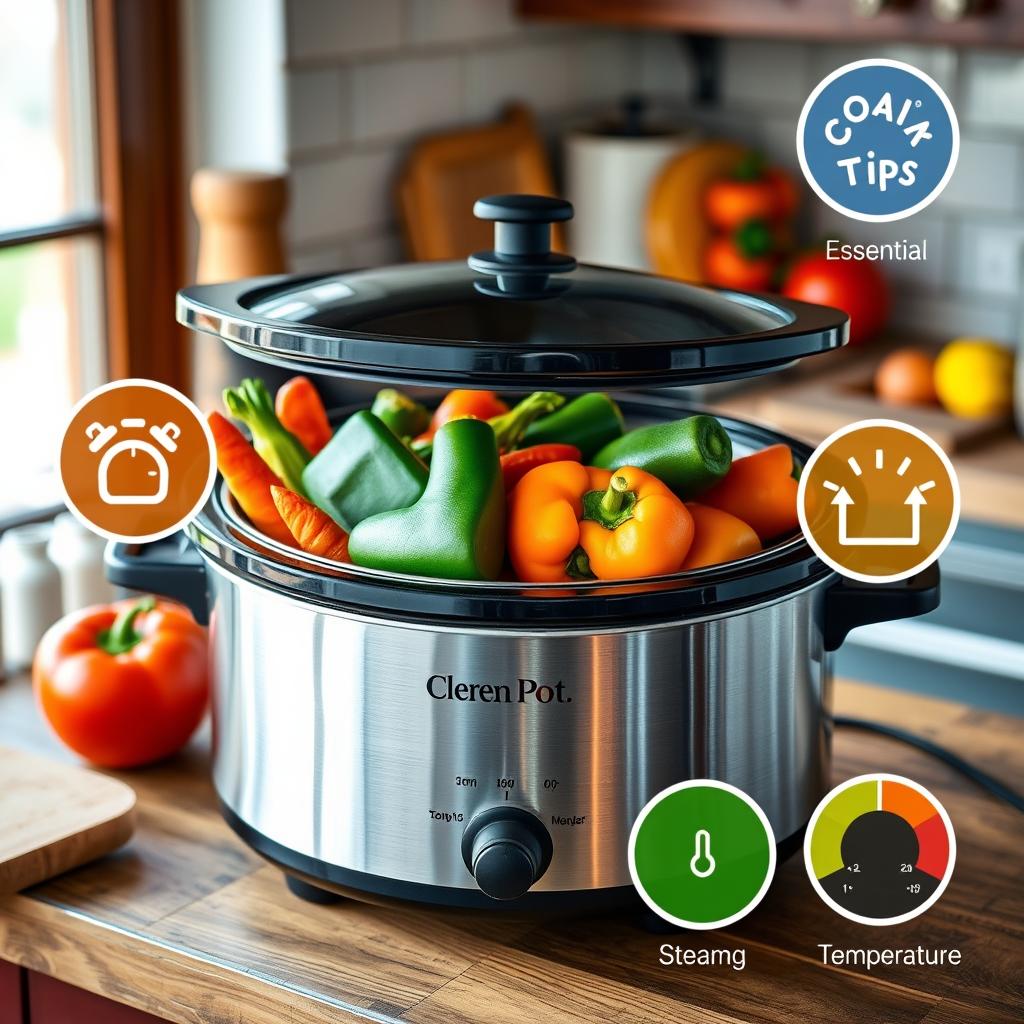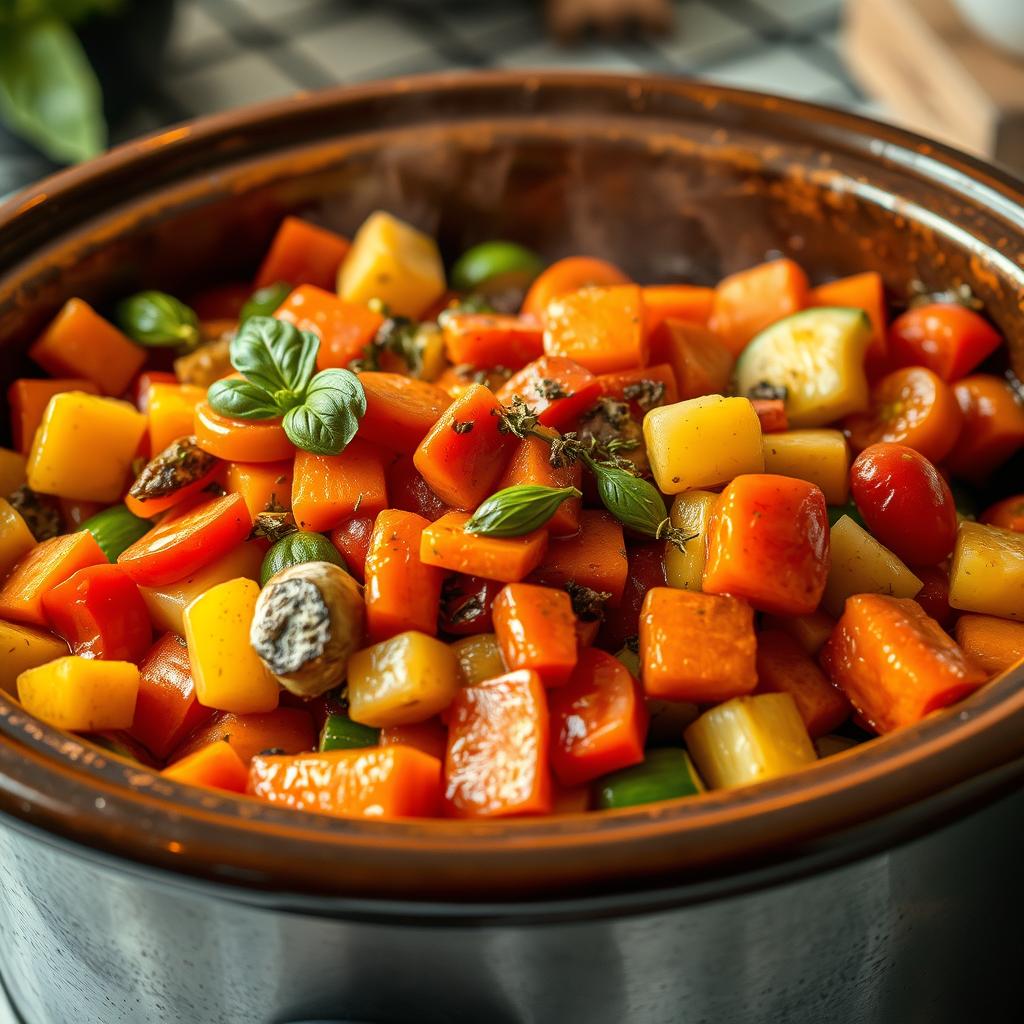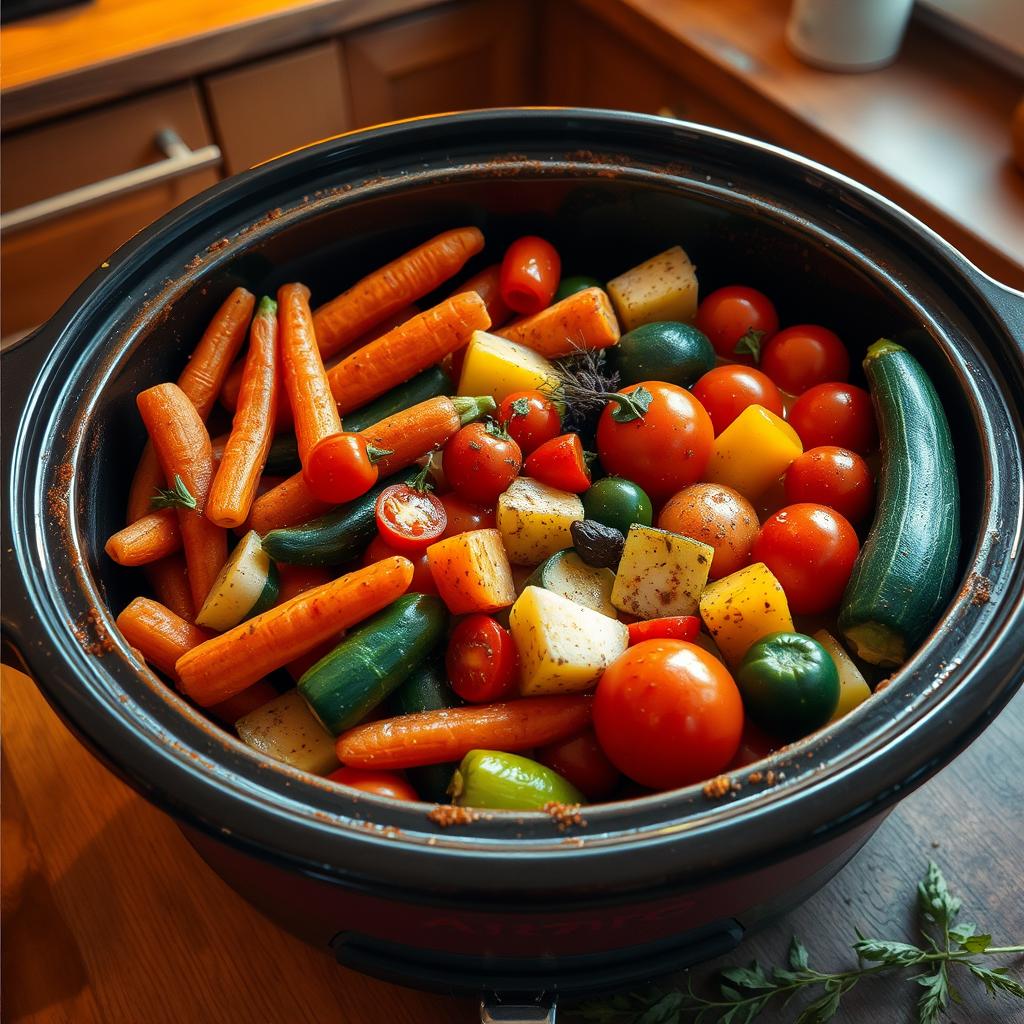Discover how simple vegetables can become delicious meals with crockpot recipes. Slow cookers have changed home cooking, making it easy for busy cooks to make healthy, tasty vegetarian meals. Your kitchen will fill with amazing smells and tastes from these easy slow cooker veggie dishes.
Imagine coming home to a ready vegetable stew or a hearty vegetable mix that’s been cooking all day. Crockpots help create deep flavors and keep your food tender and healthy. These recipes are great for vegetarians or anyone wanting to eat more plant-based meals. They’ll make you see cooking in a whole new way.
Key Takeaways
- Slow cookers create rich, developed flavors in vegetable dishes
- Minimal effort required for delicious vegetarian meals
- Nutrient preservation is enhanced through low-temperature cooking
- Perfect for meal prep and time-saving cooking strategies
- Versatile cooking method works with multiple vegetable types
Understanding Your Slow Cooker: Essential Tips for Perfect Vegetable Dishes
Mastering your slow cooker can change how you cook vegetables. Many wonder what’s the difference between a slow cooker and a crockpot. They’re the same, making cooking easier and more convenient.

Let’s explore key strategies for making tasty vegetable dishes with little effort.
Temperature Settings and Cooking Times
Knowing your slow cooker’s temperature settings is key to avoid overcooked veggies. Most have three main settings:
- Low: Great for long, slow cooking (8-10 hours)
- High: Best for quicker cooking (4-6 hours)
- Warm: Keeps food warm without cooking more
Yes, you can overcook veggies in a slow cooker. Each veggie cooks differently to keep its texture and nutrients.
Best Slow Cooker Size for Vegetable Recipes
| Slow Cooker Size | Recommended Servings | Best For |
|---|---|---|
| 2-3 quart | 1-2 people | Small side dishes |
| 4-5 quart | 3-4 people | Medium vegetable medleys |
| 6-7 quart | 5-7 people | Large family meals |
Proper Layering Techniques
Layering is an art in slow cooking. Root vegetables go at the bottom because they cook longer. Add delicate veggies like zucchini or leafy greens last to keep them from getting mushy.
“The key to perfect slow-cooker vegetables is understanding their individual cooking properties.” – Professional Chef
Looking for more veggie-packed meal ideas? Check out these high-protein slow cooker recipes with tasty veggie combinations.
Why Choose Crockpot Vegetable Recipes for Healthy Eating

Switching to healthy crockpot vegetarian meals is more than a trend. It’s a smart choice for your lifestyle. Slow cooking is great for keeping nutrients high and making tasty meals easy to fit into your busy schedule.
One big plus of crockpot cooking is how it saves nutrients. Unlike fast cooking, which can lose vitamins and minerals, slow cooking gently cooks veggies. This helps keep their nutritional value intact.
“Slow cooking is like a nutritional safety net for your vegetables, capturing every bit of goodness with minimal effort.” – Nutrition Expert
- Reduces cooking stress with minimal preparation
- Enhances vegetable flavors naturally
- Supports consistent healthy eating habits
- Minimizes nutrient loss during cooking
Your crockpot is a great way to add more veggies to your meals. Plant-based crockpot cooking lets you try new ingredients without spending hours cooking.
| Cooking Method | Nutrient Retention | Time Investment |
|---|---|---|
| Traditional Cooking | Low | High |
| Crockpot Cooking | High | Low |
Choosing healthy crockpot vegetarian meals means you’re not just cooking. You’re investing in your health with every delicious, nutritious bite.
Essential Ingredients and Prep Work for Slow Cooker Success
Getting your veggies ready for the slow cooker is key. With the right prep, you can turn simple ingredients into tasty, healthy meals. These meals will wow your family and friends.
Vegetable Cutting Techniques
Uniform cuts are important for even cooking. Here are some tips:
- Cut veggies into similar-sized pieces
- Go for 1-2 inch chunks for most recipes
- Don’t cut too small to avoid mushiness
So, can you put raw veggies in a slow cooker? Absolutely! Raw veggies are perfect for most slow cooker recipes. They keep their nutrients and texture.
Seasoning and Spice Combinations
Boost your veggie dishes with the right seasoning:
- Start with dried herbs
- Add fresh herbs in the last 30 minutes
- Try spice blends like Italian or Cajun
“The secret to great slow cooker vegetables is layering flavors through thoughtful seasoning.” – Professional Chef
Liquid Ratios and Requirements
Knowing how much liquid to use is key. Should liquid cover veggies in a slow cooker? You want enough to create steam but not drown the veggies.
- Use 1/2 to 1 cup of liquid for most veggie recipes
- Choose broths, wines, or water
- Veggies release their own moisture while cooking
Pro tip: Always leave some space at the top of your slow cooker. This allows for heat circulation and prevents overflow.
Best Vegetables for Slow Cooking and Their Cook Times
Exploring the best vegetables for slow cooking can change how you cook. Not all veggies are the same in a slow cooker. Knowing which ones are best helps you make tasty, healthy meals.
Root vegetables are top picks for slow cooking. They keep their shape and get very flavorful. Here are some of the best:
- Carrots: Perfect for 6-8 hour low-temperature cooking
- Potatoes: Ideal for hearty stews, cook for 4-6 hours
- Parsnips: Develop sweet notes after 5-7 hours of cooking
- Sweet Potatoes: Tender and flavorful after 4-5 hours
Some veggies don’t do well in a slow cooker. Delicate greens and quick-cooking veggies can get mushy. Add spinach, lettuce, and zucchini in the last 30 minutes.
“The key to perfect slow-cooker vegetables is understanding their individual cooking characteristics.” – Culinary Expert
Choosing the right veggies and timing is key to slow cooker success. Firm veggies like Brussels sprouts, butternut squash, and beets do great. They get complex flavors and stay firm.
Pro tip: Cut veggies the same size for even cooking. Big chunks are best for long cooking, and small pieces for quick recipes.
| Vegetable | Cooking Time | Recommended Setting |
|---|---|---|
| Carrots | 6-8 hours | Low |
| Potatoes | 4-6 hours | Low-Medium |
| Butternut Squash | 4-5 hours | Low |
Popular Crockpot Vegetable Recipes You’ll Love
Slow cookers are amazing kitchen tools. They turn simple ingredients into tasty meatless crock pot recipes. These appliances bring out rich flavors and make meals comforting with little effort. Whether you’re an experienced cook or new to the kitchen, these vegetable recipes will spark your next cooking adventure.
Hearty Vegetable Stews
Slow cooker vegetable stew recipes are great for cold days. Mix root vegetables, legumes, and herbs for a hearty meal. Your crockpot can make simple ingredients into a warm, nutritious dish.
- Rustic Lentil and Root Vegetable Stew
- Mediterranean Chickpea Vegetable Stew
- Spicy Southwestern Vegetable Chili
Root Vegetable Medleys
Root vegetables are stars in slow cookers, getting deep, caramelized flavors. These ingredients make incredibly rich and comforting meals. Even meat lovers will enjoy these dishes.
| Vegetable | Cooking Time | Best Seasoning |
|---|---|---|
| Carrots | 4-6 hours | Thyme and Rosemary |
| Parsnips | 5-7 hours | Cumin and Paprika |
| Sweet Potatoes | 3-5 hours | Cinnamon and Nutmeg |
Asian-Inspired Veggie Dishes
Discover global flavors with Asian-inspired vegetable recipes. These dishes mix complex spices and textures. They make meatless crock pot recipes exciting and tasty.
“Slow cooking allows flavors to develop depth and complexity that transforms simple vegetables into extraordinary meals.” – Chef Maria Rodriguez
- Korean Vegetable Bibimbap
- Thai Coconut Vegetable Curry
- Japanese Miso Vegetable Stew
Troubleshooting Common Slow Cooker Vegetable Problems
Mastering easy vegetable crockpot recipes means knowing the common issues. When cooking veggies in a slow cooker, you might face several problems. These can affect how your dish turns out.
Can you overcook vegetables in a slow cooker? Yes, you can. It’s important to know how to avoid mushy textures and keep the flavor good.
- Prevent Overcooking:
- Add delicate vegetables later in the cooking process
- Use shorter cooking times for tender vegetables
- Cut vegetables into uniform sizes
“The secret to perfect slow-cooked vegetables is timing and technique.” – Culinary Expert
Here are some key strategies to fix common slow cooker vegetable problems:
| Problem | Solution |
|---|---|
| Mushy Vegetables | Reduce cooking time, use firmer vegetable varieties |
| Watery Dishes | Drain excess liquid, use less water initially |
| Uneven Cooking | Layer vegetables properly, stir occasionally |
Pro tip: Not all vegetables cook at the same rate. Root vegetables need longer cooking times than leafy greens.
- Quick Fixes for Common Issues:
- Use high-starch vegetables as natural thickeners
- Experiment with different cutting techniques
- Adjust seasoning to enhance flavor complexity
By using these techniques, you’ll make your easy vegetable crockpot recipes much better.
Make-Ahead Tips and Meal Prep Strategies
Turning vegan crockpot dinners into meal prep can save time and reduce stress. Planning ahead lets you make tasty, easy vegetable crockpot recipes with little daily effort.
Preparing meals in advance needs smart planning and cooking. Your slow cooker is key for making healthy, easy meals all week.
Storage and Freezing Guidelines
Storing your crockpot vegetable dishes right is key. Here are some important tips:
- Cool cooked veggies completely before storing
- Use airtight containers in the fridge
- Freeze meals in small containers
- Label containers with date and what’s inside
- Most veggie dishes stay fresh 3-4 days in the fridge
Reheating Methods
Reheating your veggie crockpot recipes right keeps flavor and nutrients:
- Thaw frozen meals in the fridge overnight
- Reheat in the microwave or on the stovetop
- Add a bit of veggie broth to prevent drying
- Stir often while reheating
- Make sure it heats to 165°F
Batch Cooking Basics
Batch cooking makes your vegan crockpot dinners efficient. Spend a few hours on weekends making meals for the week.
“Meal prep is not about perfection, it’s about progress and making healthy eating easier.” – Unknown
With these tips, you’ll make cooking easier and enjoy healthy meals with less effort.
Converting Traditional Recipes to Crockpot Versions
Turning your favorite recipes into vegetarian crockpot meals is exciting. It lets you explore new flavors with little effort. Plant-based crockpot cooking makes classic dishes even better.
“Slow cooking breathes new life into traditional vegetable recipes, creating depth and richness that stovetop cooking can’t match.”
Here are some tips for changing recipes for your slow cooker:
- Reduce liquid quantities by 25-50%
- Layer ingredients strategically
- Adjust cooking times based on vegetable density
- Select appropriate temperature settings
Managing liquids is key in vegetarian crockpot meals. Unlike recipes with meat, plant-based dishes need careful liquid control. This prevents them from becoming too soggy.
| Recipe Type | Stovetop Liquid | Crockpot Adjustment |
|---|---|---|
| Vegetable Stew | 2 cups | 1-1.5 cups |
| Vegetable Curry | 1.5 cups | 1 cup |
| Root Vegetable Casserole | 1 cup | 0.5-0.75 cups |
Try your favorite recipes with these tips. Start with small batches and adjust as you get to know your slow cooker.
Conclusion
Exploring crockpot vegetable recipes opens a world of tasty and healthy meals. With slow cooking, you can make amazing dishes with little effort. The variety of healthy crockpot vegetarian meals lets you try many flavors and cooking ways.
Learning to make crockpot vegetable recipes is a smart way to cook healthy meals fast. It’s great for both new and experienced cooks. The slow cooker helps keep veggies’ flavors and nutrients intact, making meals delicious and nutritious.
The main idea is simple: crockpot vegetable recipes are a healthy, easy way to cook. By following the tips in this guide, you can make tasty, nutritious dishes. These dishes will impress your family and change how you cook at home.
Remember, the more you use your slow cooker, the better you’ll get. You’ll become more confident and skilled in making delicious vegetarian meals. Start experimenting with different ingredients and enjoy the tasty outcomes of your cooking adventures.
FAQ
What is the difference between a slow cooker and a crockpot?
A crockpot is actually a type of slow cooker. But not all slow cookers are crockpots. Crockpots have a ceramic pot inside a heating element. Other slow cookers might look different. Both cook food slowly at low temperatures.
Can I put raw vegetables in a slow cooker?
Yes, you can add raw vegetables to a slow cooker. But some veggies like root vegetables are best raw. Others might taste better if sautéed briefly first.
Should liquid cover vegetables in a slow cooker?
No, you don’t need to fully submerge vegetables. Most veggies have a lot of water. You just need enough liquid to create steam and prevent burning. About 1/2 to 1 cup of liquid is usually enough.
Can you overcook vegetables in a slow cooker?
Yes, you can overcook veggies in a slow cooker. Delicate veggies like zucchini and spinach can get mushy. Add these veggies in the last 30-60 minutes to keep them tender.
What vegetables are best for slow cooking?
Root veggies like carrots and potatoes are great for slow cooking. Winter squash, onions, and kale are also good. These veggies get rich flavors from long cooking.
What vegetables should not be added to a slow cooker?
Don’t add delicate veggies like fresh herbs and leafy greens at the start. They can get mushy. Add them later in cooking to keep them fresh.
How do I prevent vegetables from becoming too mushy in a slow cooker?
To avoid mushy veggies, cut them evenly and layer them. Add delicate veggies later. Use the low setting to keep them tender.
Can I make vegan meals in a slow cooker?
Absolutely! Slow cookers are perfect for vegan meals. You can make delicious dishes like vegetable stews and bean chilis. The slow cooking blends flavors and makes satisfying vegan meals.

